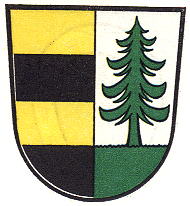Bühlertann: Difference between revisions
Knorrepoes (talk | contribs) No edit summary |
Knorrepoes (talk | contribs) m (Text replace - "[[Literature" to "{{media}} [[Literature") |
||
| Line 19: | Line 19: | ||
The pine (Tanne) tree is a canting symbol. The bars in the right half of the shield are derived from the arms of the Abbott of Ellwangen at the time, from the Thumb von Neuburg family. | The pine (Tanne) tree is a canting symbol. The bars in the right half of the shield are derived from the arms of the Abbott of Ellwangen at the time, from the Thumb von Neuburg family. | ||
{{media}} | |||
[[Literature]] : Stadler, K. : Deutsche Wappen - Bundesrepublik Deutschland. Angelsachsen Verlag, 1964-1971, 8 volumes. | [[Literature]] : Stadler, K. : Deutsche Wappen - Bundesrepublik Deutschland. Angelsachsen Verlag, 1964-1971, 8 volumes. | ||
Revision as of 19:41, 8 July 2014
| Heraldry of the World Civic heraldry of Germany - Deutsche Wappen (Gemeindewappen/Kreiswappen) |
BÜHLERTANN
State : Baden-Württemberg
District (Kreis) : Schwäbisch Hall
Official blazon
In gespaltenem Schild vorne dreimal von Gold und Schwarz geteilt, hinten in Silber auf grünem Dreiberg eine grüne Tanne.
Origin/meaning
The castle at Bühlertann was first mentioned as Tannberg in 1228 as a possession of the Ellwangen Imperial Abbey. The arms were granted in 1510 by Emperor Maximilian II.
The pine (Tanne) tree is a canting symbol. The bars in the right half of the shield are derived from the arms of the Abbott of Ellwangen at the time, from the Thumb von Neuburg family.
Contact and Support
Partners:
Your logo here ?
Contact us
© since 1995, Heraldry of the World, Ralf Hartemink 
Index of the site
Literature : Stadler, K. : Deutsche Wappen - Bundesrepublik Deutschland. Angelsachsen Verlag, 1964-1971, 8 volumes.











